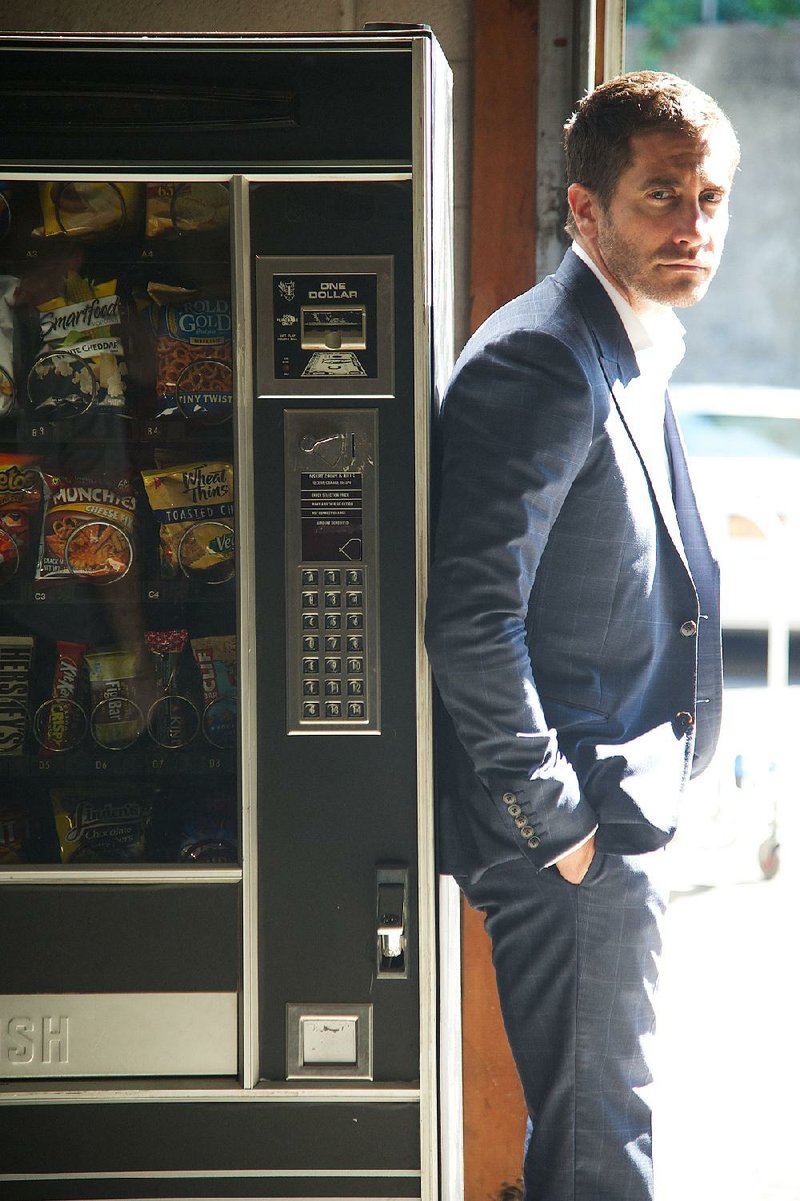Hollywood has a long and storied tradition of lauding the Grand Truth Teller. These figures can be impetuously callow (The Graduate); hypnotized (Office Space); driven to insanity (Fight Club); in full lust with a high-schooler (American Beauty); or just horrifically irascible (As Good as It Gets).
They can also be very young and precocious (Big) or old and beyond caring (Philomena), but they are almost always presented as the audience surrogate: They call it the way they see it, unburdened by pettiness, social contrivance or general convention. They’re the stuffy-suited dudes who suddenly spring into spontaneous dance on a crowded subway car in a Pepsi commercial, or the comic element in an otherwise bland smear of narrative pabulum. They are exalted, justified and often revered, occasionally even stricken, Jesus-like, as with Cool Hand Luke, forced to pay for others’ sins, a sacrifice to the smarmy gods of conventionality.
Davis (Jake Gyllenhaal) would seem at first an unlikely such Grand Truth Teller when we first meet him, a not uncommon trope with these sort of figures. He’s on his phone, talking calmly about business acquisitions in a fine suit, his beautiful wife, Julia (Heather Lind), behind the wheel. But then horrible tragedy strikes, and Davis is left bereft. At first, he barely betrays any sort of emotion — at his wife’s wake, he stands in front of a mirror in the bathroom, allowing himself only the briefest waves of grief before tamping everything back down in order to compose himself.
With nothing else to do, he returns almost immediately to his office, desperately wanting purpose and protection in a cocoon of activity, but his father-in-law boss (Chris Cooper, who seems to have lost more on-screen children in his career than is statistically possible) sends him home shortly after Davis starts displaying erratic behavior.
He wants to take things apart for one thing. First, just mechanisms and appliances but later, he pays his way onto a demo team so he can really start the business of smashing everything around him to bits. In the film’s most fey gambit, he also befriends a woman named Karen (Naomi Watts), who pores over his lengthy and insanely oversharing complaint letters to a local vending machine company with whom she works in customer service. Karen has a 15-year-old son, Chris (Judah Lewis), still trying to determine his sexual identity — though honestly he just comes across as an arrogant brat for a majority of his scenes — a kid whom Davis, with his newfound honest clarity, naturally befriends.
He continues his bevy of impulse control issues and increases them, destroying huge sections of his own house with Chris, whom he outfits with safety goggles and a sledgehammer — which is at least better than when he lets the kid shoot him at point-blank range while wearing a Kevlar vest. I suppose we’re meant to be rooting for Davis, seeing his character as the one person in the film willing to call it as it is and keep everyone else real in the process, but instead, he just comes across as peculiarly disaffected and deranged. He might not be a bad person, but Bryan Sipe’s screenplay continuously mistakes senseless psychosis for wisdom.
In the end, the Grand Truth Teller often becomes little more than dramatic device, used as a cheat by screenwriters to spur the necessary amounts of change in their more conventional characters’ lives. We can vicariously thrill as they spurn social convention and break down barriers and norms in order to drive at the truth but as Nicholson famously barks, the actual truth is, few of us could likely handle it in the first place: The human condition is one of intense denial and dishonesty, after all.
Sipe has it that Davis is searching for just the right jolt to knock his emotions back into coherence — hence his curious enjoyment of stepping on nails and getting shot — but it feels entirely contrived, an ill-formed dramatic contraption that has virtually no bearing on true human grief and impediment. He’s just another petulant kid demanding the world come up to his standard.
You can appreciate the care with which director Jean-Marc Vallee has crafted the film, and the committed emotional constriction of Gyllenhaal, who specializes, after all, in characters with emotional detachment problems but the thing feels like a con job, a put-on about a character so removed from his grief, he’s convinced it will take a sledgehammer to knock it back into him.
MovieStyle on 04/08/2016

